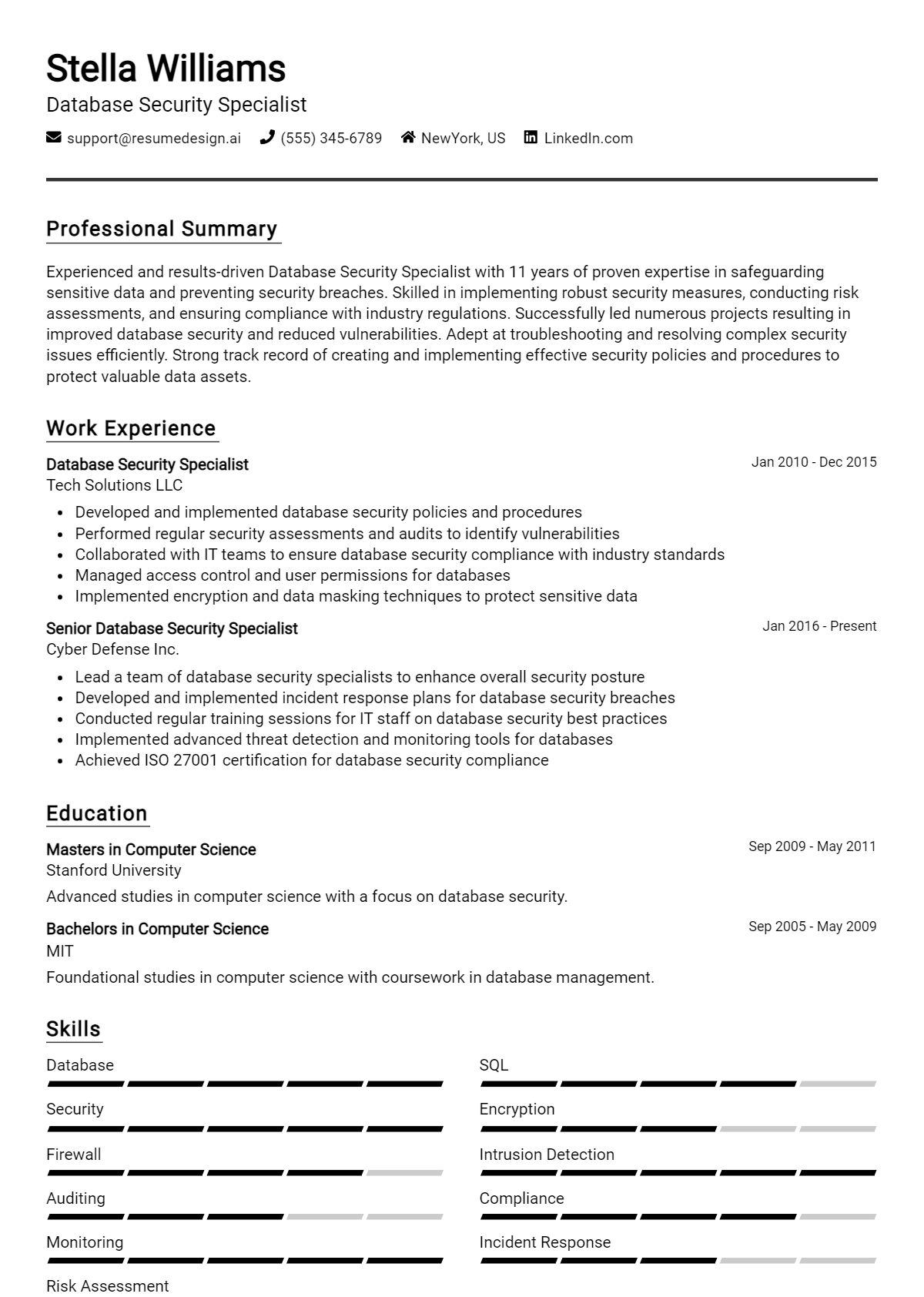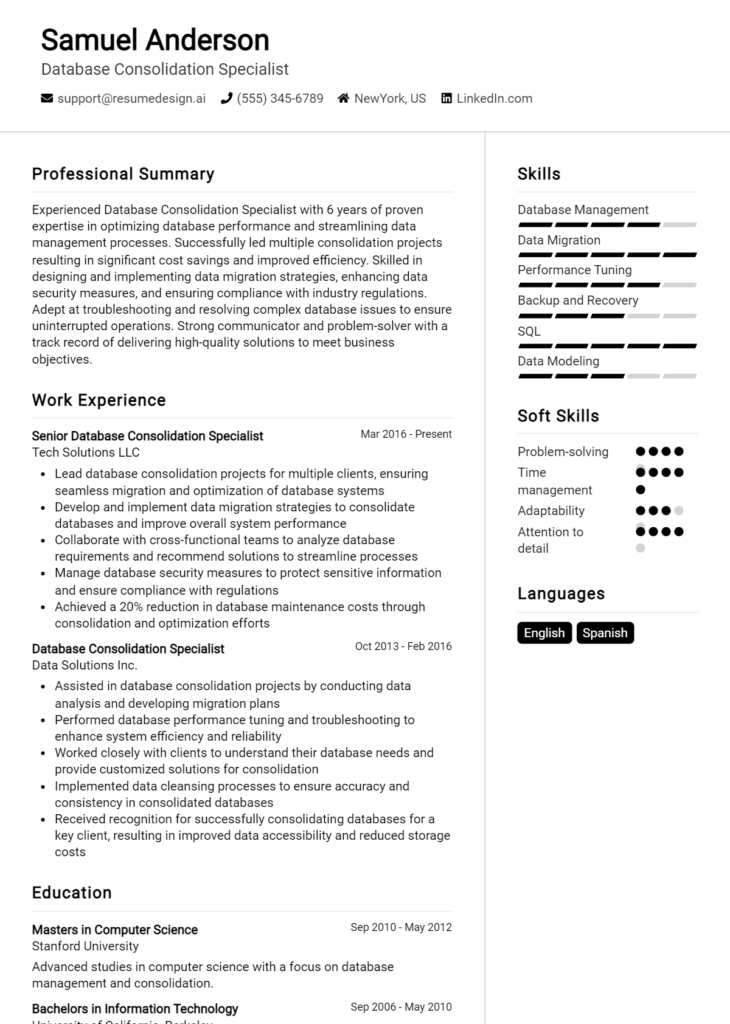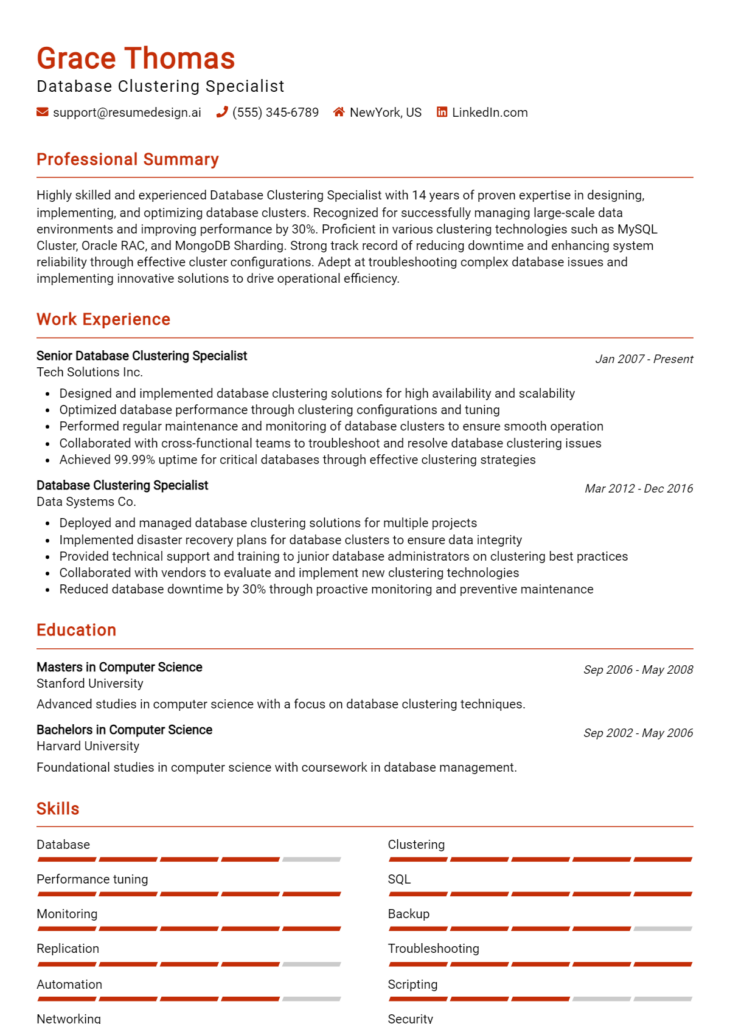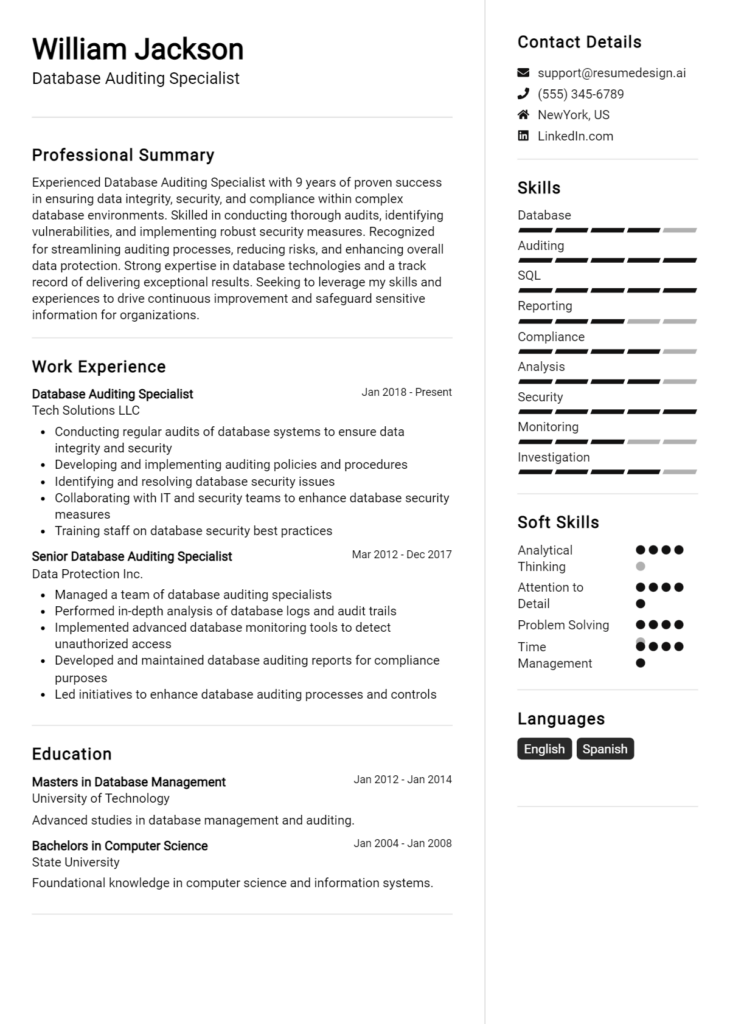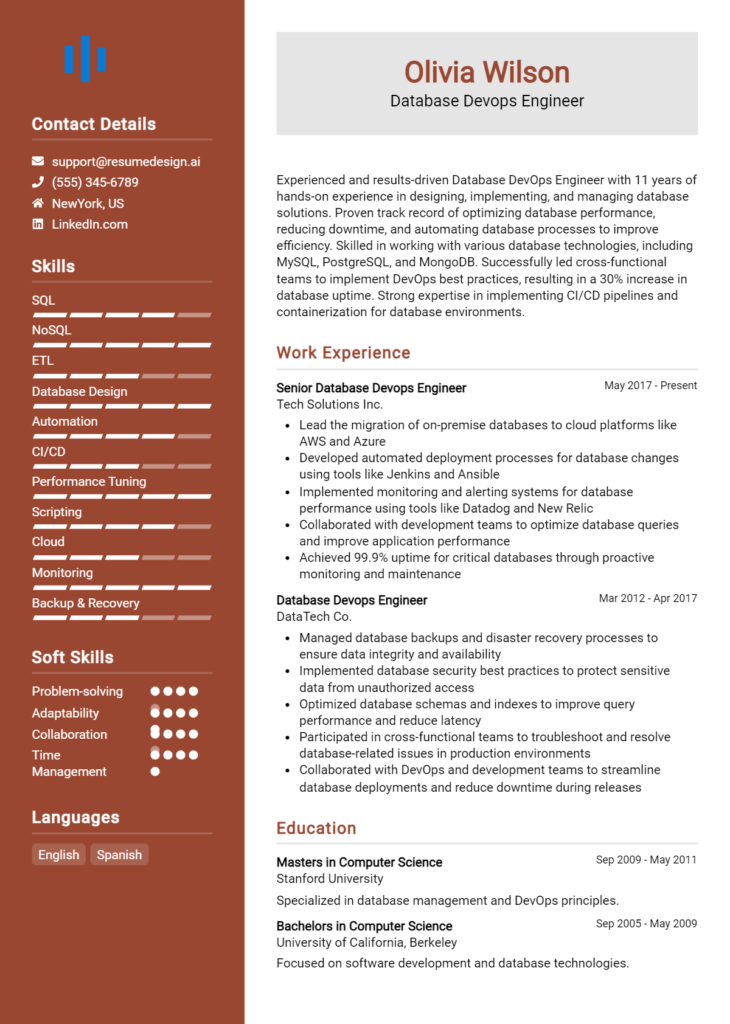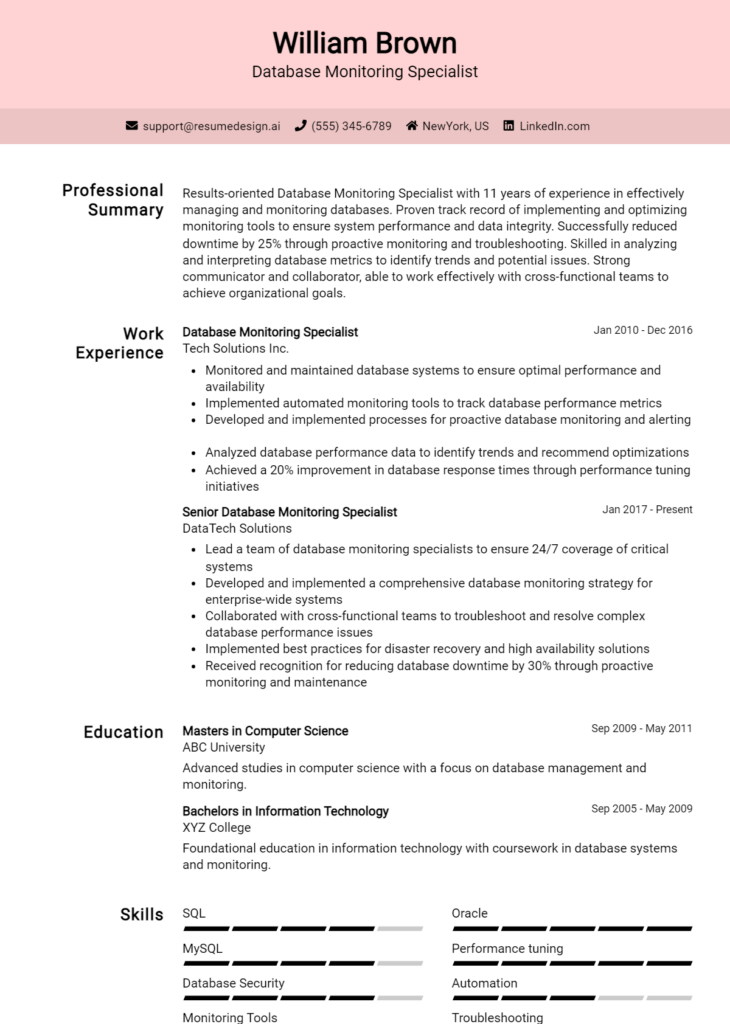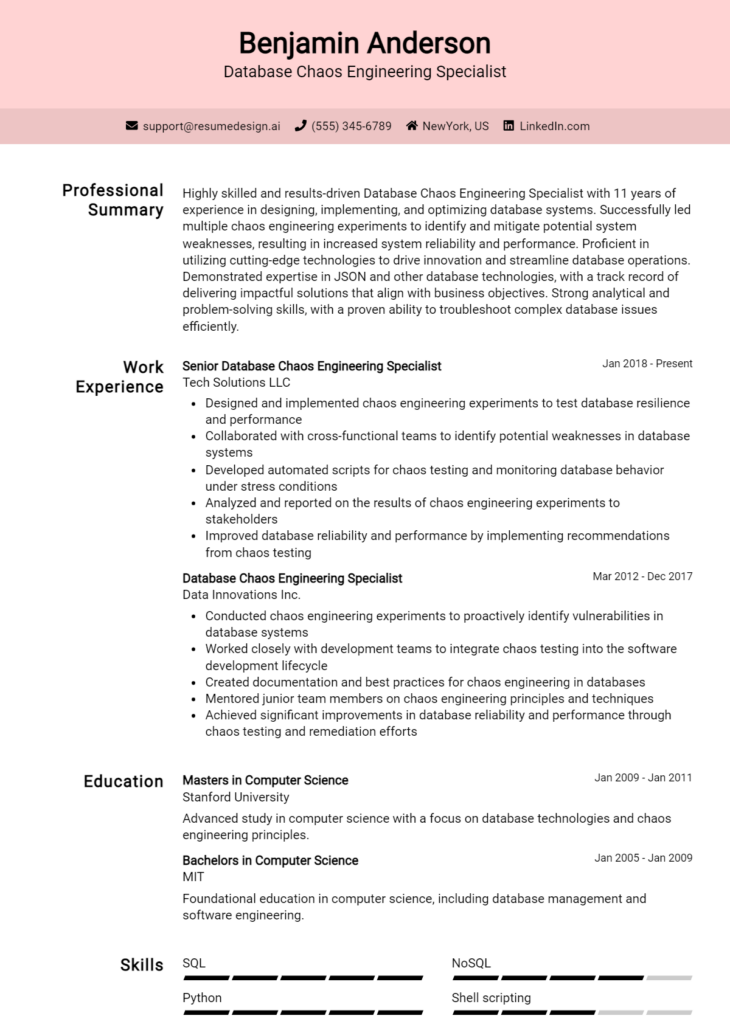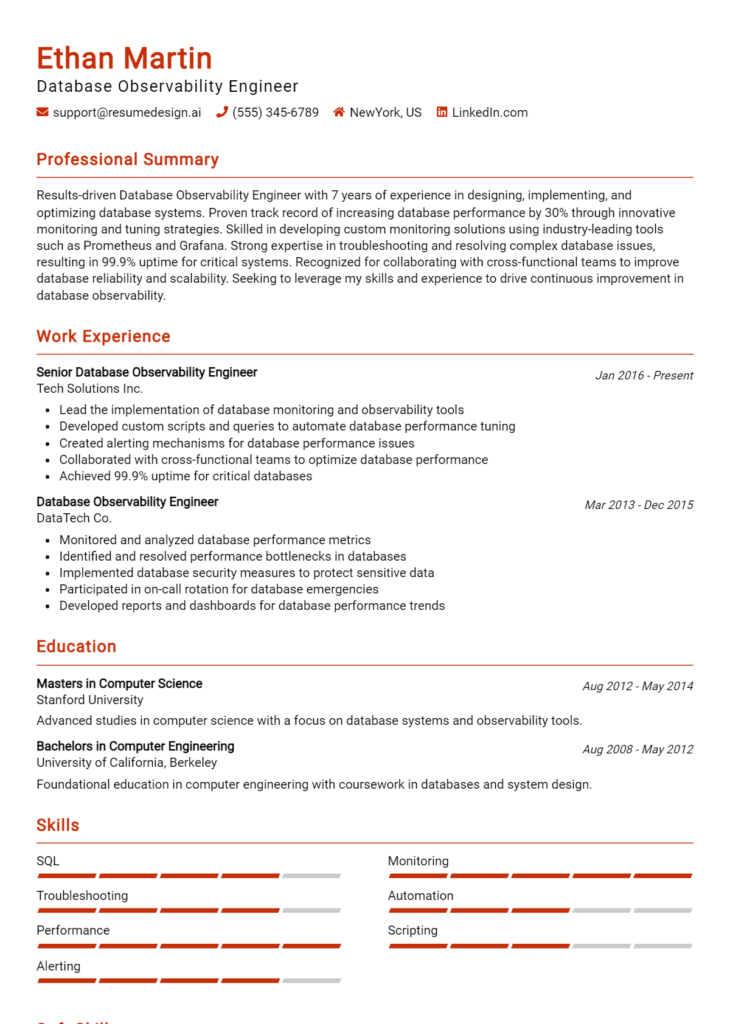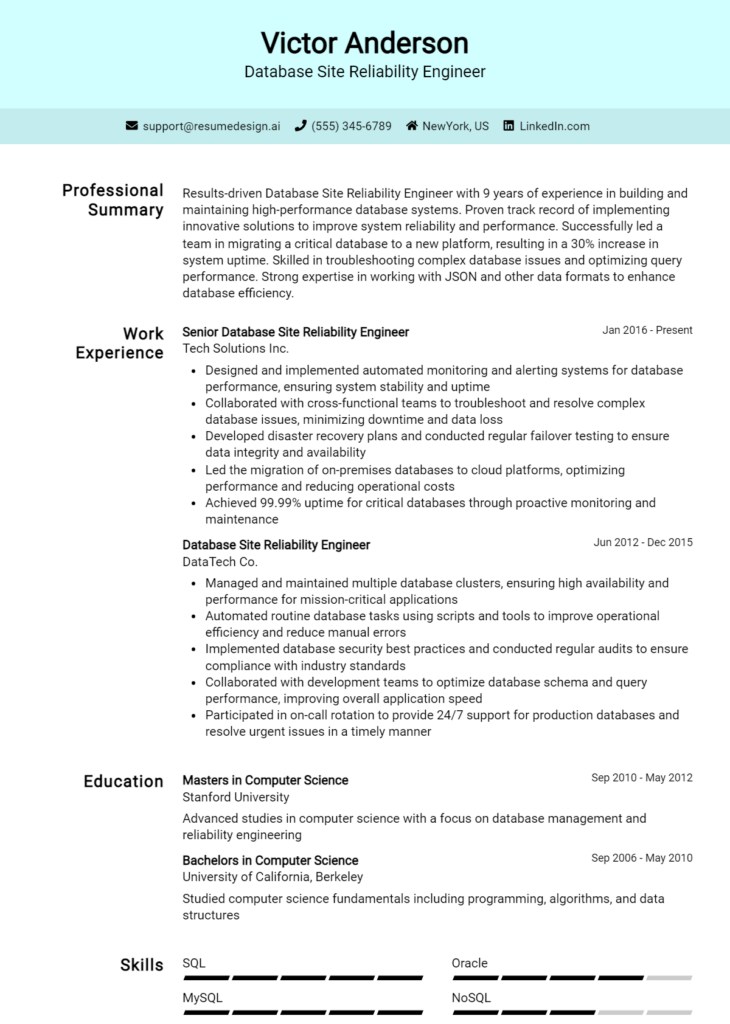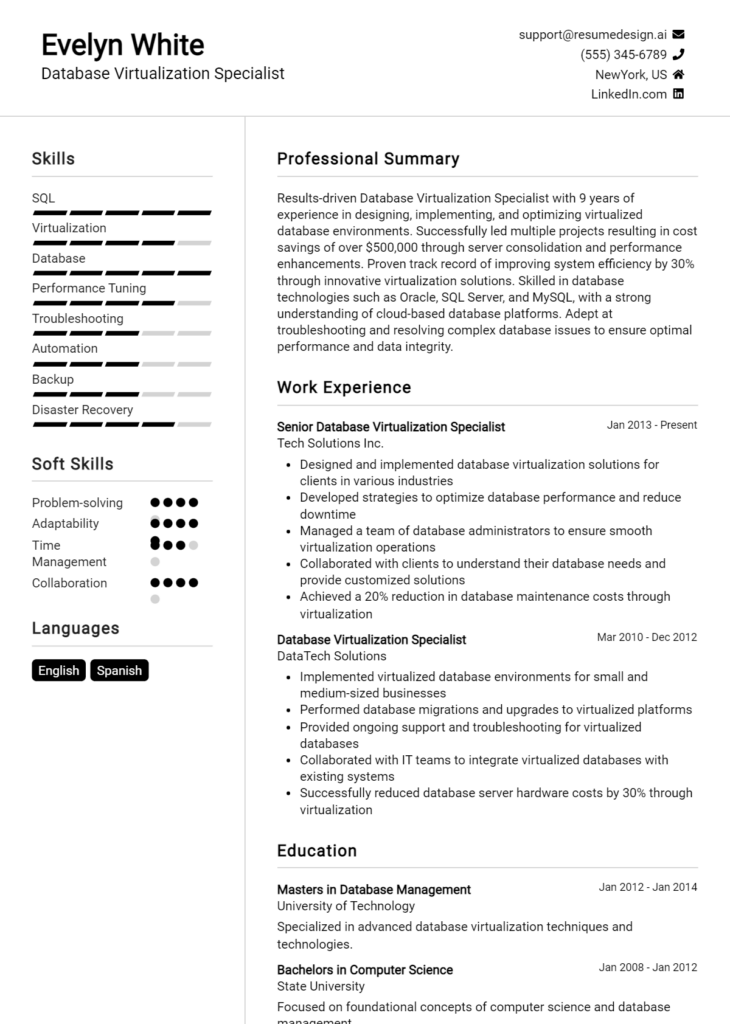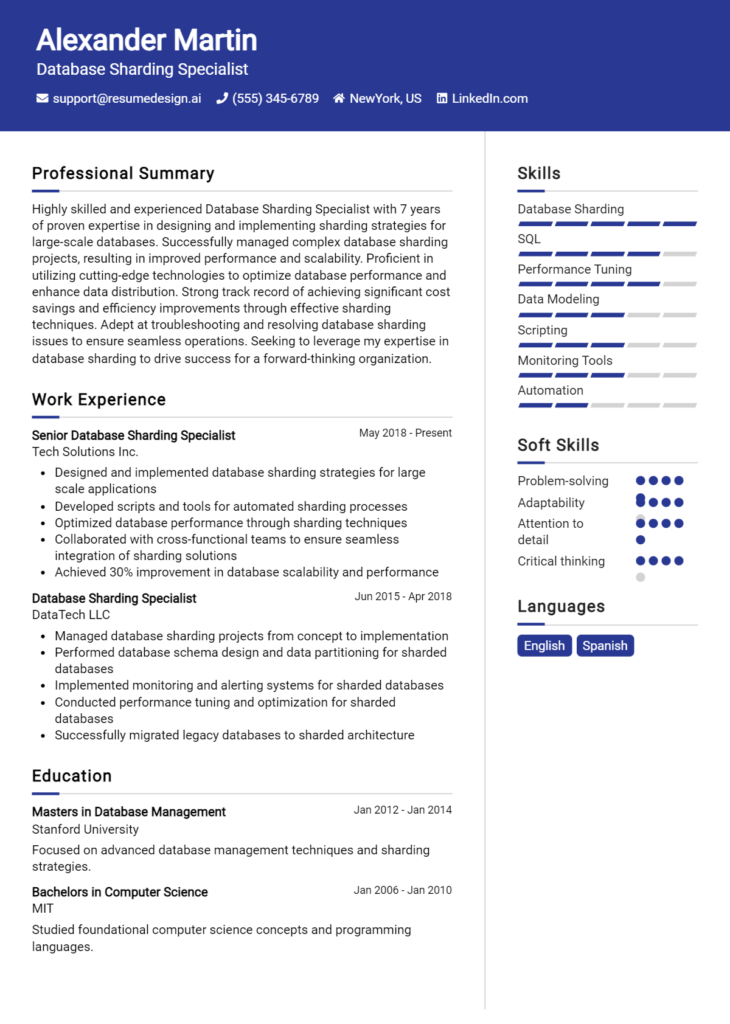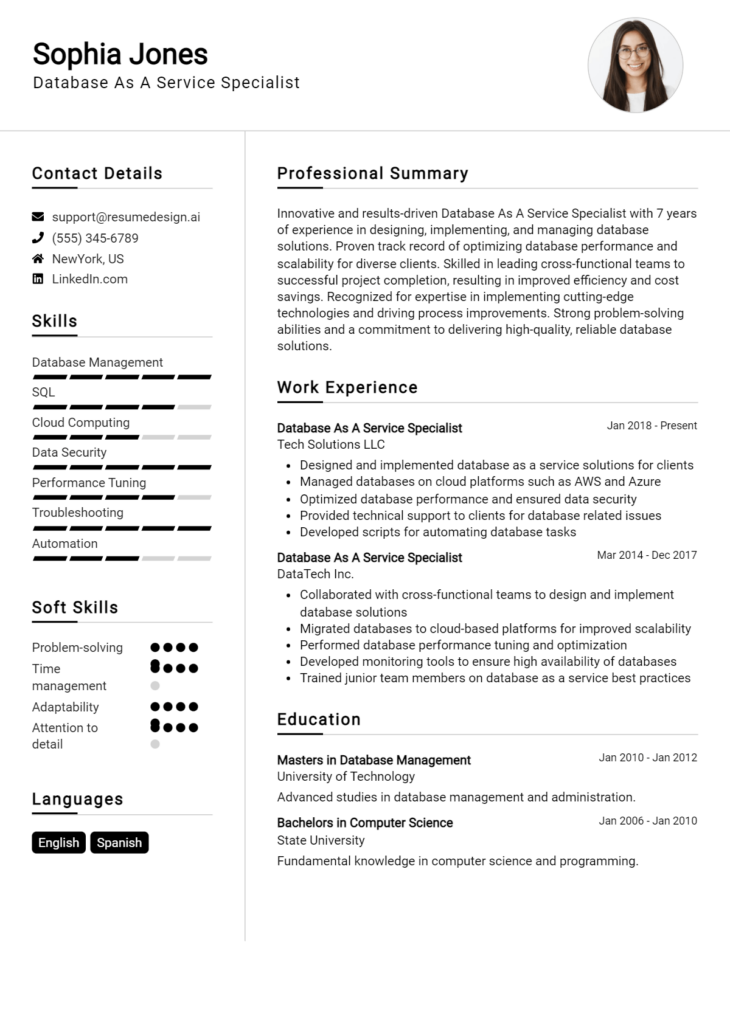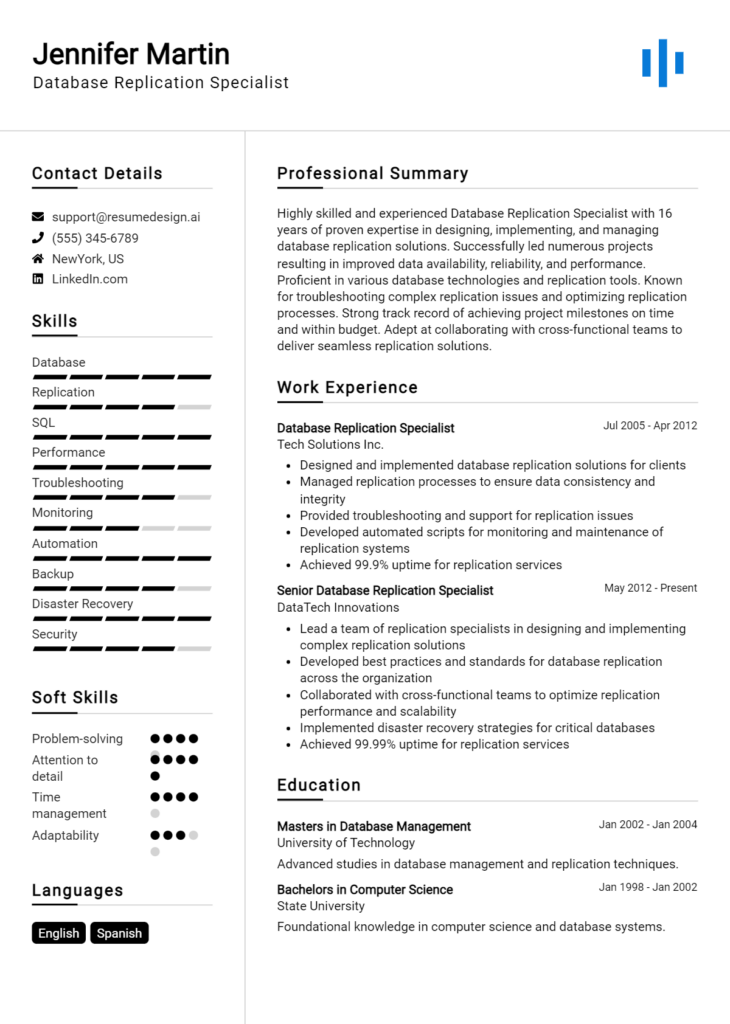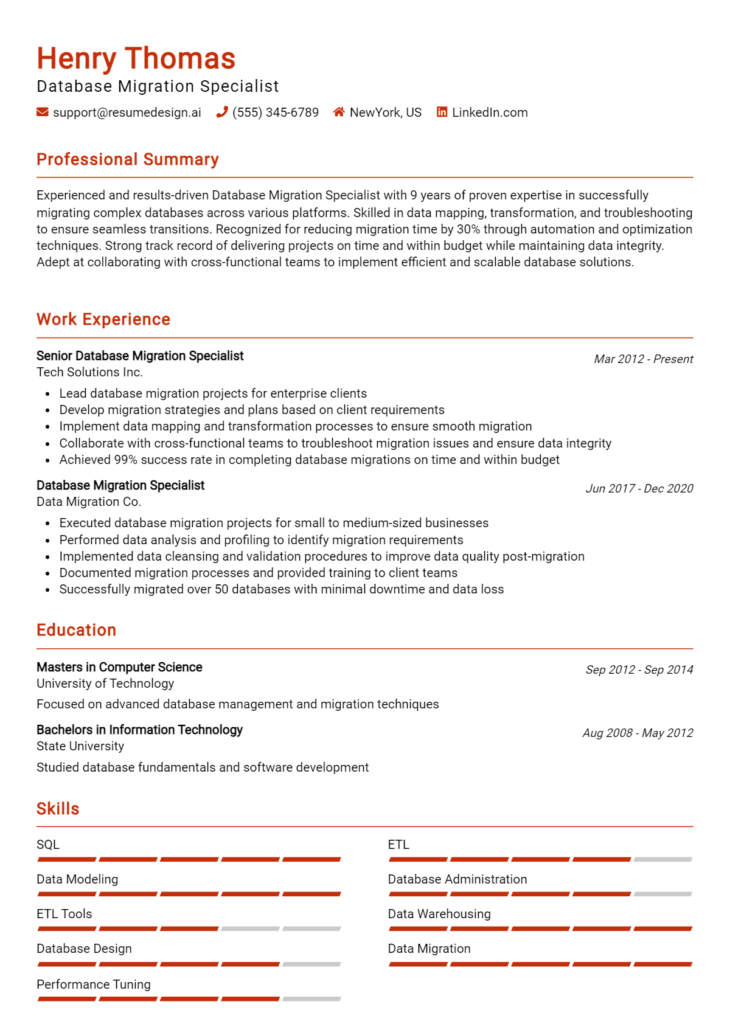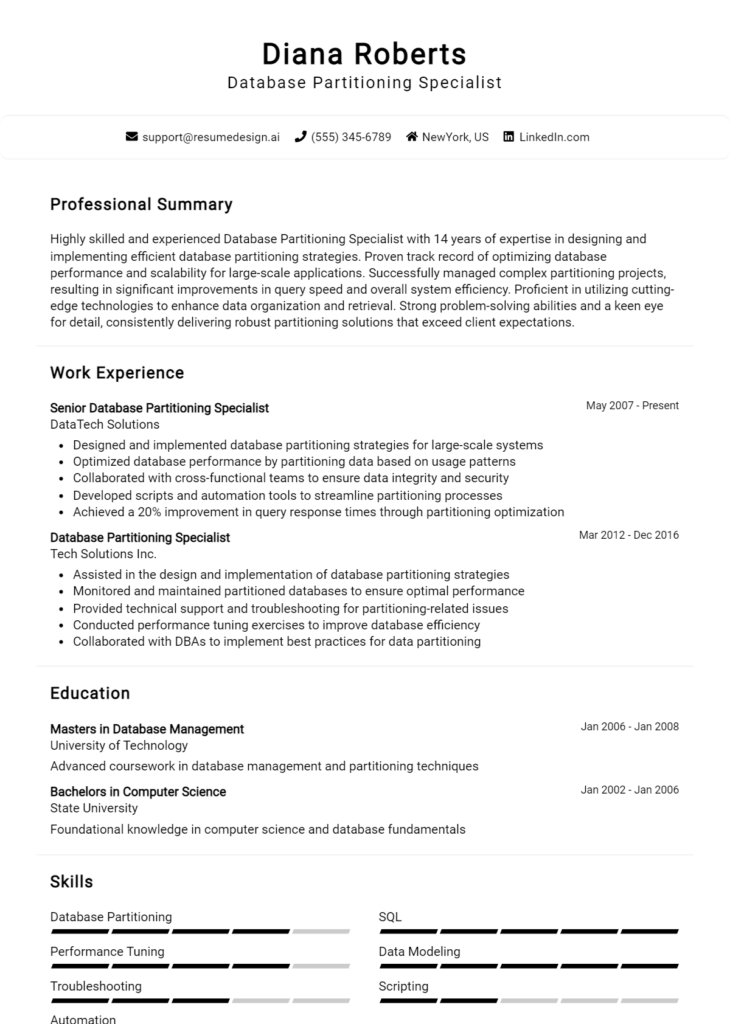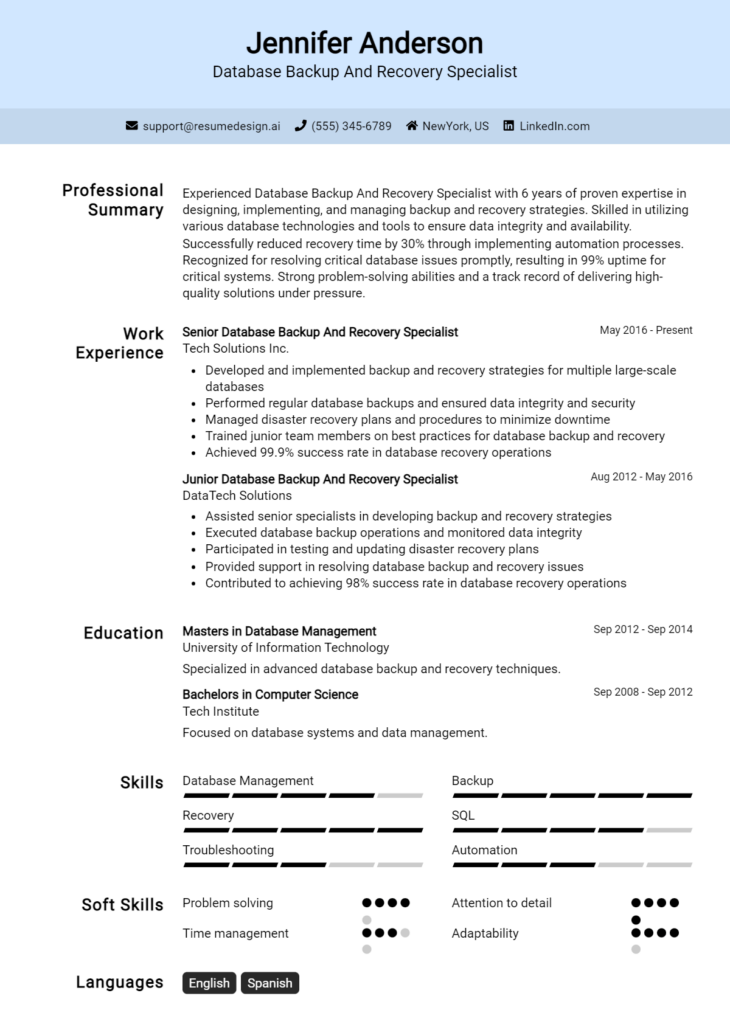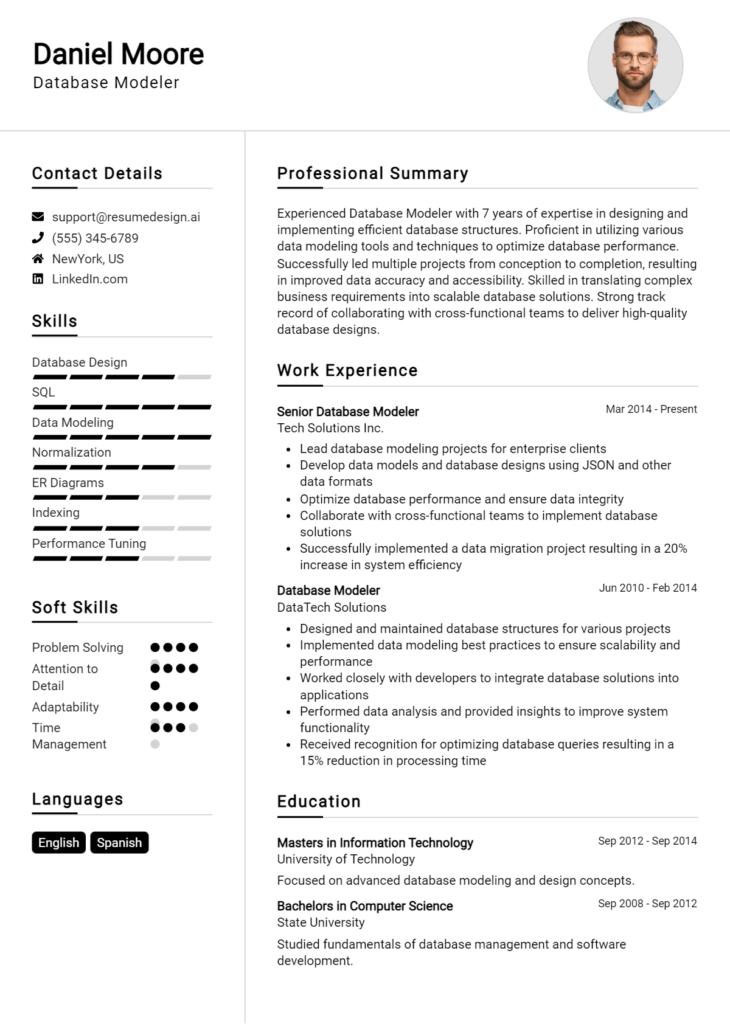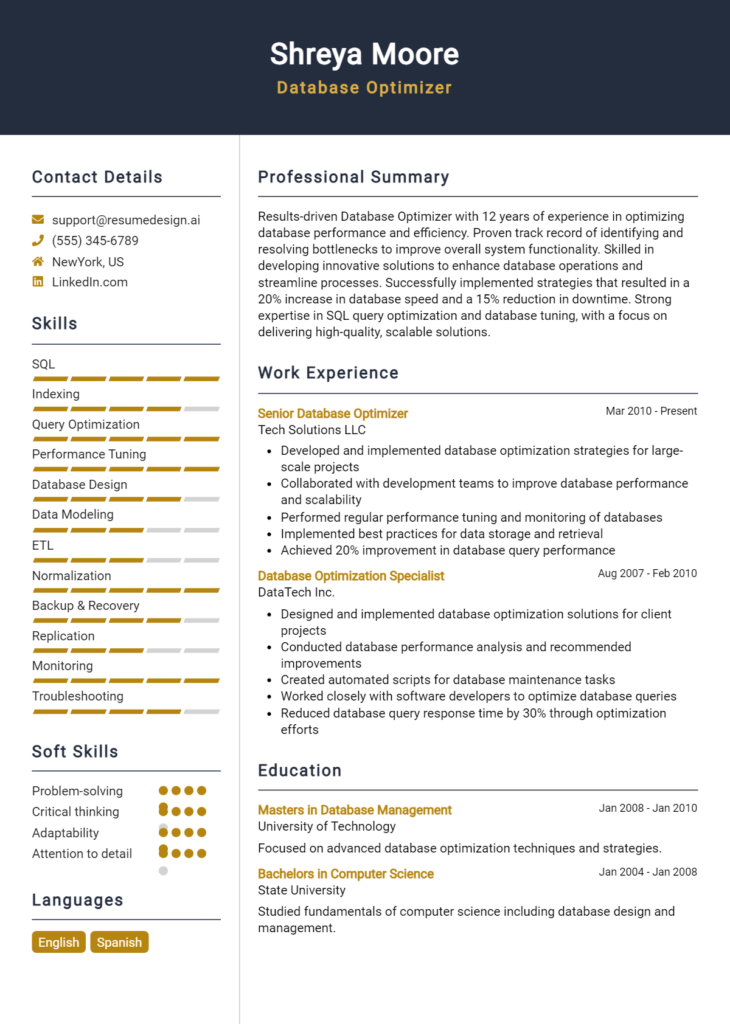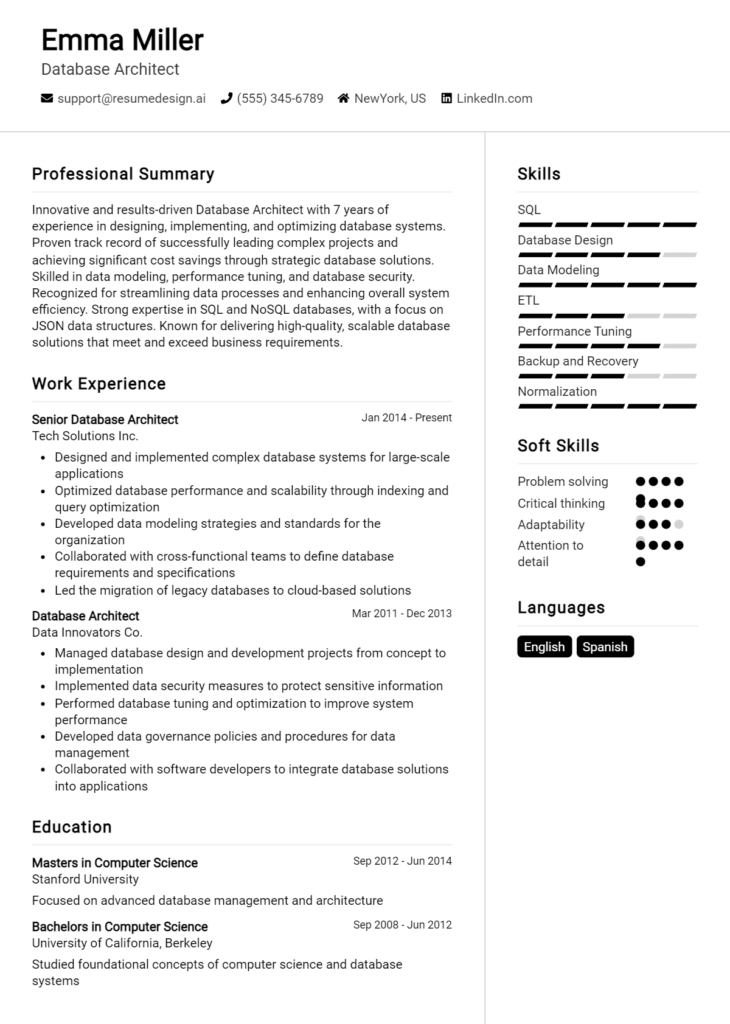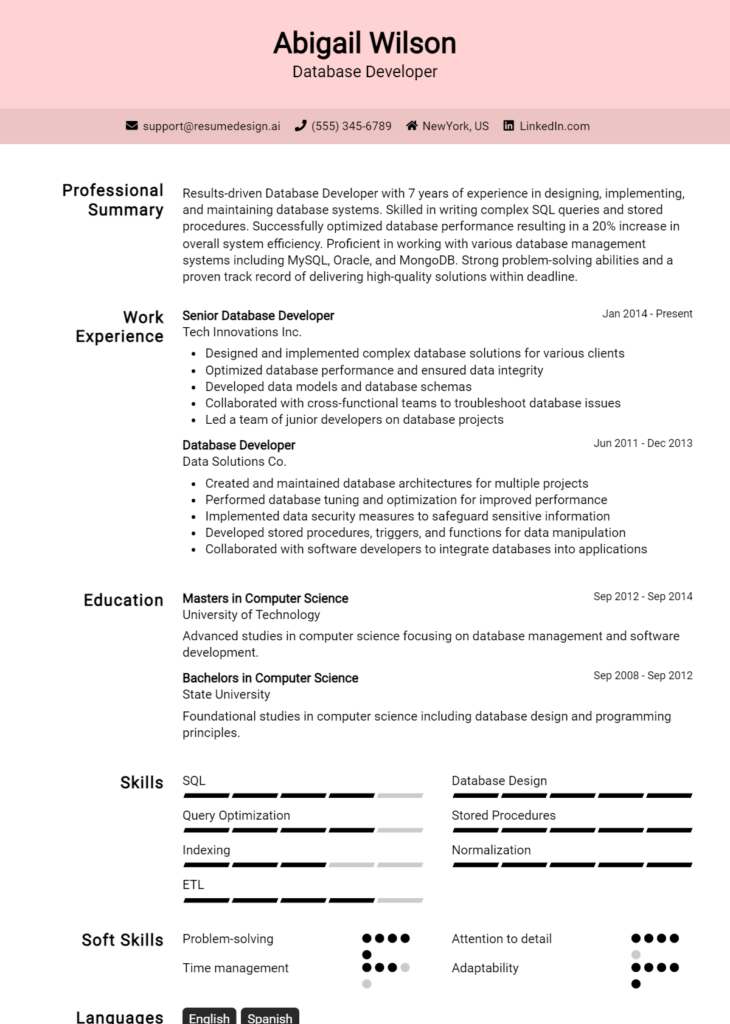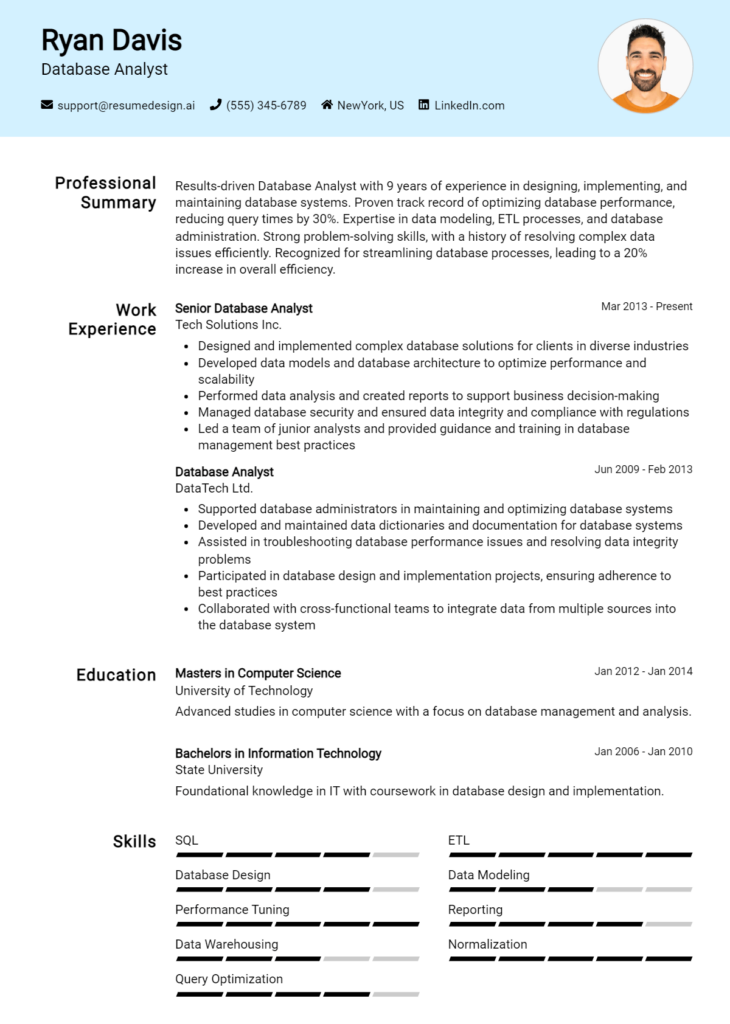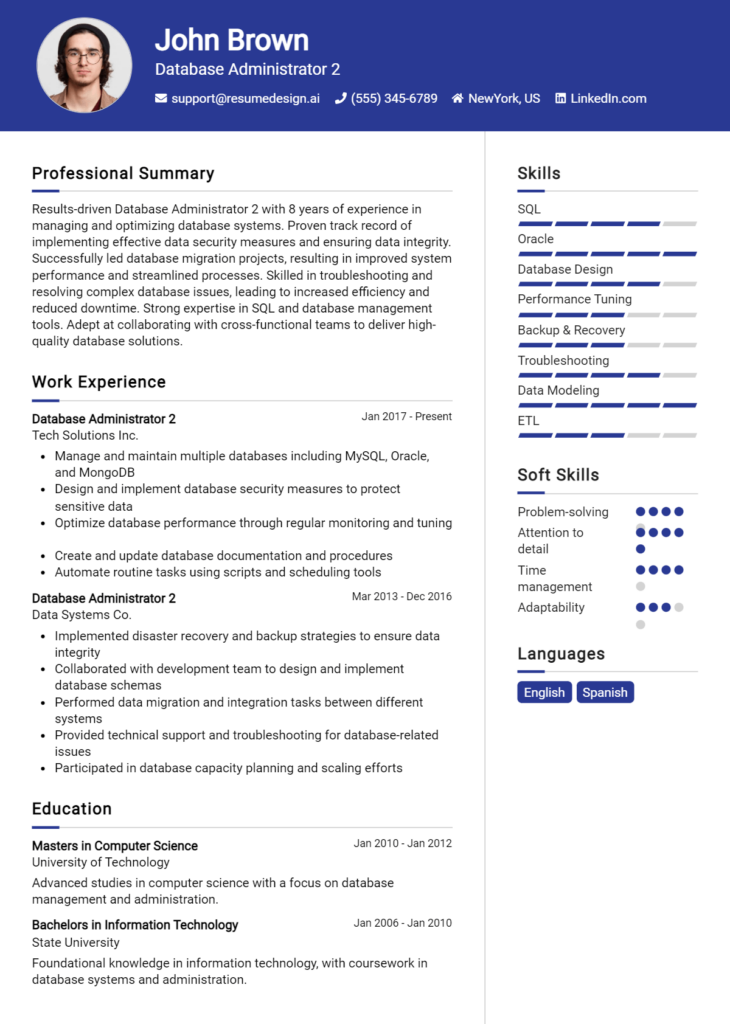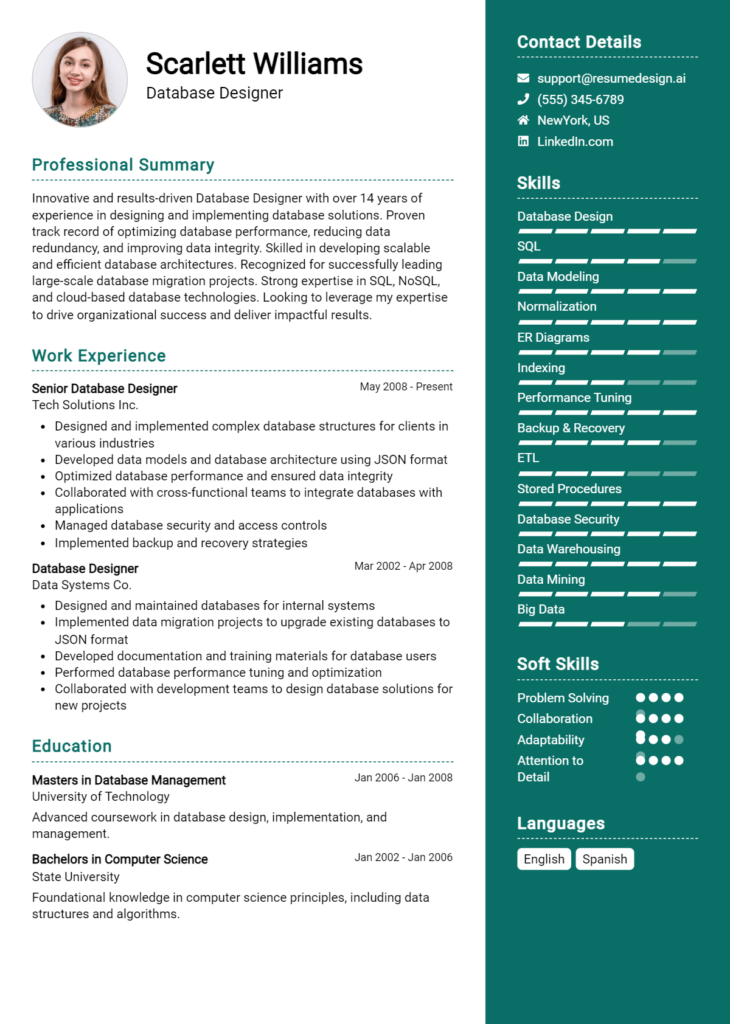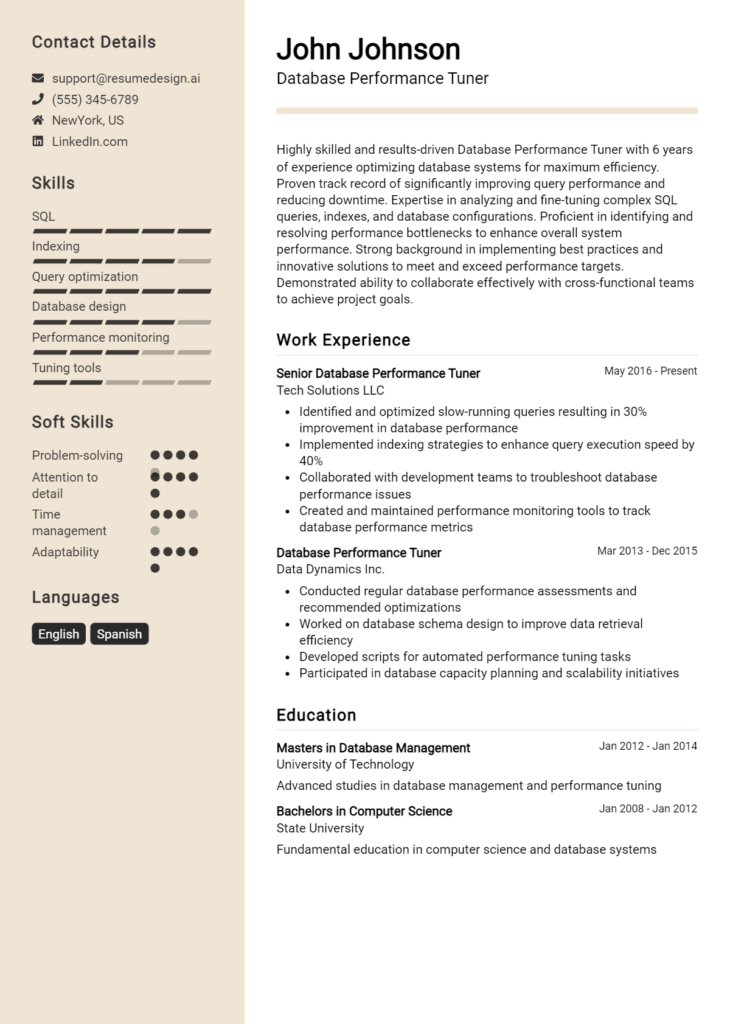Database Security Specialist Core Responsibilities
A Database Security Specialist is responsible for protecting an organization's data by implementing security measures, monitoring databases for vulnerabilities, and ensuring compliance with regulations. This role requires strong technical skills in database management, operational awareness to coordinate with IT and compliance departments, and problem-solving abilities to address security threats. These professionals play a crucial role in safeguarding sensitive information, contributing to organizational goals by minimizing risks. A well-crafted resume can effectively highlight these skills and experiences, showcasing the candidate's ability to bridge various functions within the organization.
Common Responsibilities Listed on Database Security Specialist Resume
- Implementing database security measures and protocols.
- Monitoring database activity for suspicious behavior.
- Conducting regular security audits and vulnerability assessments.
- Ensuring compliance with data protection regulations and standards.
- Collaborating with IT and development teams on security policies.
- Performing risk assessments and developing mitigation strategies.
- Responding to security incidents and breaches effectively.
- Providing training and guidance on security best practices.
- Maintaining documentation of security procedures and incidents.
- Evaluating and implementing security tools and technologies.
- Staying updated on the latest security threats and trends.
High-Level Resume Tips for Database Security Specialist Professionals
In today's digital landscape, where data breaches and cyber threats are rampant, the role of a Database Security Specialist is more critical than ever. A well-crafted resume serves as the first impression a candidate makes on a potential employer, making it essential to highlight not only technical skills but also key achievements in the field. Your resume must effectively communicate your expertise in safeguarding sensitive information, ensuring compliance with regulations, and implementing robust security measures. This guide will provide practical and actionable resume tips specifically tailored for Database Security Specialist professionals, helping you stand out in a competitive job market.
Top Resume Tips for Database Security Specialist Professionals
- Tailor your resume for each job application by closely aligning your skills and experiences with the job description.
- Highlight relevant experience in database security, including specific technologies and methodologies you have worked with.
- Quantify your achievements by including metrics, such as the percentage of data breaches prevented or performance improvements achieved.
- Showcase your knowledge of industry standards and compliance regulations, such as GDPR, HIPAA, or PCI DSS.
- Emphasize any certifications you hold, such as CISSP, CISM, or Certified Information Systems Auditor (CISA).
- Include a section dedicated to technical skills, listing specific tools and technologies related to database security, like encryption software or intrusion detection systems.
- Incorporate keywords from the job posting to enhance your resume's visibility in applicant tracking systems (ATS).
- Demonstrate your problem-solving abilities by providing examples of challenges you've tackled in previous roles.
- Keep the format clean and professional, ensuring that your resume is easy to read and visually appealing.
- Proofread for any spelling or grammatical errors, as attention to detail is crucial in the field of information security.
By implementing these tips, you can significantly increase your chances of landing a job in the Database Security Specialist field. A polished and targeted resume will not only showcase your qualifications but also demonstrate your commitment to the security of vital data, making you an attractive candidate to potential employers.
Why Resume Headlines & Titles are Important for Database Security Specialist
In the competitive landscape of job applications, a well-crafted resume headline or title serves as a critical first impression for a Database Security Specialist. This brief yet powerful phrase not only captures the attention of hiring managers but also succinctly summarizes a candidate’s key qualifications and unique selling points. A strong headline can quickly convey a candidate's expertise in database security, risk management, and compliance, making it easier for recruiters to identify top talent. Therefore, it is essential that the headline is concise, relevant, and directly aligned with the job being applied for, ensuring that it stands out among numerous applications.
Best Practices for Crafting Resume Headlines for Database Security Specialist
- Use industry-specific keywords that reflect your expertise.
- Keep it concise, ideally under 10 words.
- Highlight your most relevant skills or certifications.
- Focus on results and accomplishments when possible.
- Avoid generic phrases; be specific about your role.
- Consider including years of experience to add credibility.
- Tailor your headline to match the job description.
- Use strong action words to convey confidence and capability.
Example Resume Headlines for Database Security Specialist
Strong Resume Headlines
Expert Database Security Specialist with 7+ Years in Risk Management
Certified Information Systems Security Professional (CISSP) Focused on Data Protection
Database Security Analyst Proven in Compliance and Vulnerability Assessment
Accomplished Database Security Expert with Track Record in Threat Mitigation
Weak Resume Headlines
Database Security Specialist
IT Professional Seeking Opportunities
Experienced in Database Management
Strong resume headlines are effective because they are precise, tailored to the role, and highlight the candidate’s unique value proposition. They immediately inform hiring managers of the applicant's expertise and relevance to the position. In contrast, weak headlines lack specificity and fail to make a memorable impact, rendering them forgettable amidst a sea of applications. By avoiding generic language and focusing on individual accomplishments, candidates can create a compelling first impression that distinguishes them from the competition.
Writing an Exceptional Database Security Specialist Resume Summary
A well-crafted resume summary is crucial for Database Security Specialists as it serves as the first impression a hiring manager receives about a candidate. A strong summary succinctly highlights key skills, relevant experience, and notable accomplishments that align with the needs of the position. It quickly captures the attention of hiring managers, allowing them to see the candidate's potential value to their organization. By being concise and impactful, and tailored to the specific job application, a resume summary sets the tone for the rest of the resume and can significantly influence the candidate's opportunity for an interview.
Best Practices for Writing a Database Security Specialist Resume Summary
- Quantify Achievements: Use specific numbers or percentages to demonstrate your impact in previous roles.
- Focus on Key Skills: Highlight essential skills such as risk assessment, compliance, and vulnerability management.
- Tailor to Job Description: Customize your summary to reflect the specific requirements and responsibilities outlined in the job posting.
- Include Relevant Certifications: Mention any industry-recognized certifications that bolster your qualifications.
- Showcase Technical Proficiency: Emphasize familiarity with security tools, databases, and programming languages relevant to the role.
- Be Concise: Keep your summary brief, ideally within 3-4 sentences, to maintain clarity and impact.
- Highlight Soft Skills: Include interpersonal skills such as teamwork and communication that are vital for collaboration with other departments.
- Use Action Verbs: Start sentences with strong action verbs to convey confidence and proactivity.
Example Database Security Specialist Resume Summaries
Strong Resume Summaries
Results-driven Database Security Specialist with over 7 years of experience in safeguarding sensitive data. Achieved a 30% reduction in security breaches through the implementation of advanced encryption protocols and regular compliance audits. Certified in CISSP and CISM, with expertise in risk assessment and incident response.
Detail-oriented Database Security Specialist specializing in vulnerability management and threat analysis. Successfully led a project that increased database security efficiency by 40%, decreasing unauthorized access incidents by 50%. Proficient in SQL, Oracle, and data masking techniques.
Dedicated Database Security Specialist with a proven track record of developing and enforcing data protection policies. Increased data recovery rates by 25% through strategic backup solutions and consistent monitoring. Holds certifications in AWS Security and CompTIA Security+.
Weak Resume Summaries
Database Security Specialist with experience in security and databases. Looking for a position to utilize my skills.
I have worked with databases and security measures. I am a hardworking individual seeking new opportunities in database security.
The strong resume summaries are considered effective because they provide specific accomplishments, quantify results, and highlight relevant skills and certifications, making them directly applicable to the role of a Database Security Specialist. In contrast, the weak summaries lack detail and specificity, making it difficult for hiring managers to gauge the candidate's qualifications and potential impact on the organization.
Work Experience Section for Database Security Specialist Resume
The work experience section of a Database Security Specialist resume is crucial as it serves as a window into the candidate's technical abilities, leadership skills, and capacity to deliver high-quality outcomes in database security. This section not only highlights the candidate's hands-on experience with security protocols, encryption, and vulnerability assessments but also showcases their ability to manage teams and collaborate effectively with cross-functional groups. By quantifying achievements and aligning experiences with industry standards, candidates can demonstrate their significant contributions and value to potential employers, making this section a key element of their resume.
Best Practices for Database Security Specialist Work Experience
- Use action verbs to start each bullet point, demonstrating proactive involvement.
- Quantify achievements with metrics, such as percentage improvements in security, reduction in incidents, or number of databases secured.
- Highlight specific technologies and tools used, such as firewalls, encryption methods, or security monitoring systems.
- Emphasize collaboration by mentioning cross-departmental projects and team leadership roles.
- Customize the experience to align with job descriptions, using relevant keywords.
- Include certifications or training relevant to specific job functions or technologies.
- Showcase problem-solving skills by detailing challenges faced and solutions implemented.
- Maintain clarity and conciseness, ensuring easy readability for hiring managers.
Example Work Experiences for Database Security Specialist
Strong Experiences
- Led a team of 5 in implementing a new encryption protocol that reduced data breach incidents by 40% within the first year.
- Developed and executed a comprehensive security audit that identified and rectified 150 vulnerabilities, resulting in a 30% improvement in compliance scores.
- Collaborated with IT and development teams to integrate security measures into the software lifecycle, reducing security-related issues by 50% during the testing phase.
- Managed a database migration project that involved securing over 200,000 records, achieving a 100% success rate with zero data loss.
Weak Experiences
- Worked on database security tasks as needed without specifying outcomes or responsibilities.
- Assisted in projects related to data security, but did not clarify the extent of involvement or results.
- Participated in team meetings to discuss security issues without detailing specific contributions or solutions.
- Helped in maintaining database security, but failed to mention any tools or techniques used.
The examples provided illustrate the stark contrast between strong and weak experiences. Strong experiences are characterized by clear, quantifiable outcomes, specific technical skills, and evidence of collaboration and leadership. In contrast, weak experiences lack detail, measurable achievements, and fail to convey the candidate's direct contributions to database security initiatives. This disparity highlights the importance of articulating experience effectively to stand out in a competitive job market.
Education and Certifications Section for Database Security Specialist Resume
The education and certifications section of a Database Security Specialist resume plays a crucial role in establishing a candidate's qualifications and expertise in the field of database security. This section not only showcases the academic background and relevant degrees but also highlights industry-recognized certifications that are essential for validating a candidate’s knowledge and skills. Moreover, it reflects the candidate's commitment to continuous learning and staying updated with the latest trends and technologies in database security. Including relevant coursework and specialized training can significantly enhance a candidate's credibility, demonstrating their alignment with the specific requirements of the job role and their readiness to tackle the challenges of database security.
Best Practices for Database Security Specialist Education and Certifications
- Highlight relevant degrees, such as a Bachelor's or Master's in Computer Science, Information Technology, or Cybersecurity.
- Include industry-recognized certifications like Certified Information Systems Security Professional (CISSP) or Certified Information Security Manager (CISM).
- Specify relevant coursework that demonstrates knowledge of database management, encryption, and security protocols.
- Emphasize specialized training programs or workshops that focus on database security technologies and practices.
- List any additional certifications related to specific database systems (e.g., Oracle, Microsoft SQL Server) to show versatility.
- Keep the information concise and relevant to the Database Security Specialist role, avoiding unnecessary details.
- Update the section regularly to reflect new certifications or coursework completed.
- Use clear formatting to enhance readability and highlight key qualifications.
Example Education and Certifications for Database Security Specialist
Strong Examples
- Bachelor of Science in Cybersecurity, University of Technology (2018)
- Certified Information Systems Security Professional (CISSP), (2021)
- Coursework in Database Security and Management, including SQL Injection Prevention Techniques.
- Oracle Database Security Certified Implementation Specialist, (2022)
Weak Examples
- Bachelor of Arts in History, University of Arts (2015)
- Basic Computer Skills Certification (2016)
- Certificate in Microsoft Office Applications (2017)
- Outdated certification in Windows Server Administration (2014)
The examples listed as strong are considered appropriate as they directly relate to the field of database security, showcasing relevant education, recognized certifications, and specialized coursework that align with the responsibilities of a Database Security Specialist. In contrast, the weak examples lack relevance to the job role, focusing on unrelated degrees and outdated or basic certifications that do not demonstrate advanced skills or knowledge in database security practices.
Top Skills & Keywords for Database Security Specialist Resume
As the digital landscape continues to evolve, the importance of database security cannot be overstated. A Database Security Specialist plays a crucial role in protecting sensitive information from unauthorized access, breaches, and other cyber threats. To effectively showcase a candidate's qualifications for this position, a well-crafted resume should highlight both hard and soft skills that reflect the technical competencies and interpersonal abilities essential for success in the role. Including relevant skills not only demonstrates expertise but also aligns a candidate with the specific requirements of potential employers, making it more likely to stand out in a competitive job market. For more insights on vital skills, you can check this skills resource.
Top Hard & Soft Skills for Database Security Specialist
Soft Skills
- Attention to Detail
- Analytical Thinking
- Problem-Solving Skills
- Communication Skills
- Team Collaboration
- Adaptability
- Time Management
- Critical Thinking
- Creativity
- Leadership
Hard Skills
- Database Management Systems (DBMS) Knowledge
- SQL and NoSQL Proficiency
- Cybersecurity Protocols
- Data Encryption Techniques
- Vulnerability Assessment
- Risk Management
- Incident Response Planning
- Regulatory Compliance (GDPR, HIPAA)
- Backup and Recovery Solutions
- Security Information and Event Management (SIEM)
In addition to these skills, relevant work experience is crucial for demonstrating a candidate's capability and readiness for a Database Security Specialist position.
Stand Out with a Winning Database Security Specialist Cover Letter
Dear [Hiring Manager's Name],
I am writing to express my interest in the Database Security Specialist position at [Company Name] as advertised on [Where You Found the Job Posting]. With a strong background in database management and a specialized focus on security protocols, I am excited about the opportunity to contribute to your team and help safeguard your organization's sensitive data. My experience in implementing robust security measures and conducting thorough risk assessments aligns well with the responsibilities outlined in the job description.
In my previous role at [Previous Company Name], I led initiatives to enhance our database security architecture, resulting in a 40% decrease in security incidents over the span of two years. My expertise in encryption technologies, access control mechanisms, and vulnerability assessments has equipped me with the skills necessary to identify potential threats and develop effective mitigation strategies. I am also well-versed in compliance requirements, including GDPR and HIPAA, ensuring that all database operations adhere to regulatory standards.
I pride myself on my ability to collaborate effectively with cross-functional teams, bridging the gap between technical and non-technical stakeholders. My proactive approach to training and educating team members on best security practices has fostered a culture of security awareness within the organization. I am eager to bring this collaborative mindset to [Company Name], working closely with your IT and development teams to enhance the security posture of your database systems.
Thank you for considering my application. I am looking forward to the opportunity to discuss how my skills and experiences can contribute to the ongoing success of [Company Name]. I am excited about the prospect of joining your team and am eager to help strengthen your database security initiatives.
Sincerely,
[Your Name]
[Your Contact Information]
Common Mistakes to Avoid in a Database Security Specialist Resume
When crafting a resume for a Database Security Specialist position, it's crucial to present your skills and experiences in a manner that highlights your expertise while avoiding common pitfalls. A well-structured resume can significantly impact your chances of landing an interview, but many candidates make mistakes that could undermine their qualifications. Here are some common mistakes to avoid:
Neglecting Keywords: Failing to include industry-specific keywords can lead to your resume being filtered out by Applicant Tracking Systems (ATS). Ensure you incorporate relevant terms from the job description.
Lack of Specific Achievements: Instead of listing generic responsibilities, focus on quantifiable achievements. Use metrics to demonstrate the impact of your work, such as percentage reductions in security incidents or the number of vulnerabilities mitigated.
Overloading with Technical Jargon: While technical knowledge is essential, bombarding the reader with excessive jargon can alienate non-technical recruiters. Balance technical terms with clear explanations to ensure your resume is accessible.
Ignoring Soft Skills: Database security isn’t just about technical skills; it also requires problem-solving, communication, and teamwork. Highlighting relevant soft skills can differentiate you from other candidates.
Inconsistent Formatting: A cluttered or inconsistent format can distract from your qualifications. Use a clean, professional layout with uniform fonts, bullet points, and headings to enhance readability.
Omitting Relevant Certifications: Certifications like Certified Information Systems Security Professional (CISSP) or Certified Information Security Manager (CISM) are highly regarded in the field. Make sure to prominently display any relevant certifications you hold.
Focusing on Irrelevant Experience: Tailor your resume to the database security role by emphasizing relevant experience. Avoid including unrelated job duties that don’t contribute to your qualifications for the position.
Failing to Proofread: Spelling and grammatical errors can create a negative impression of your attention to detail. Always proofread your resume multiple times and consider having someone else review it for clarity and accuracy.
Conclusion
As we conclude our discussion on the role of a Database Security Specialist, it's essential to highlight the critical responsibilities and skills that define this position. A Database Security Specialist is tasked with protecting sensitive data from unauthorized access and breaches, ensuring compliance with industry regulations, and implementing robust security measures. Key areas of focus include risk assessment, database encryption, user access controls, and regular security audits.
Moreover, staying updated on emerging threats and evolving security technologies is vital for anyone in this role. Continuous education and hands-on experience with database management systems and security protocols are crucial for success.
Now, as you reflect on your qualifications and experiences, take a moment to review your resume for the Database Security Specialist position. A well-crafted resume is your first step towards landing your ideal job. To assist you in this process, consider utilizing various tools available to enhance your application materials.
Explore resume templates to find a design that suits your style, or use the resume builder for a streamlined experience in creating your document. Don't forget to check out resume examples for inspiration and to ensure you highlight your relevant skills effectively. Additionally, enhance your job application with a compelling cover letter by utilizing our cover letter templates.
Take action today—revise your resume and prepare to stand out in the competitive field of database security!

